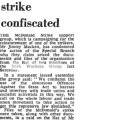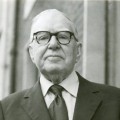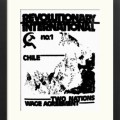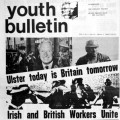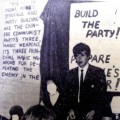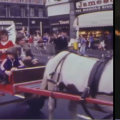Articles
These articles expand on the history of particular organisations or publications.
It’s remarkable how short the entry for Irish Militant Tendency is on wiki. Here it is…
Militant
The Irish Workers Group (IWG) was formed sometime around the end of 1975 following a series of expulsions that year from the Socialist Workers Movement (SWM). In 1977 the IWG produced Class Struggle, a theoretical journal of which twenty issues were produced over the next ten years.
Irish Workers' Group [1976]
The overview of the Irish Workers’ Group from the Irish Left Open History Project (available here) received a number of corrections and comments from former members when it was originally published. These are reproduced in part here (the original and complete comments can be read on the Irish Left Review website).
Irish Workers' Group [1976]
The Irish Workers Group (IWG) was formed in London in 1966, out of the divisions within the Irish Communist Group. It is argued by D.R. O’Connor Lysaght that the IWG was the first active Trotskyist group to establish itself in Ireland since the Revolutionary Socialist Party of the 1940s. This does not mean that the origins of modern Irish Trotskyism lie within the IWG – the SWM/SWP and Militant/Socialist Party, who arrived in the 1970s, are both outside its borders, while the Socialist Labour League had activists in Ireland contemporaneous to the IWP – merely that it is pivotal to any understanding of the Trotskyist movement on the island. Indeed, in terms of personnel, if not quite ideology, it is possible to trace the IWG in 1967 to the present-day Workers Unemployed Action Group in Clonmel, as well as Socialist Democracy.
Irish Workers' Group [1966]
A Marxian socialist, secularist, trade unionist and internationalist, Laurence John (John) Swift was born at 83 Clanbrassil Street, Dundalk, County Louth, on 26 August 1896. He was the eldest of four children of Dundalk-born Alice Swift, née Deane (1861-1918) and Patrick Swift (1858-1926), who ran a bakery business, Swift and Cooper, jointly with relatives, also at 83 Clanbrassil Street. A few years following John’s birth, the family moved their residence, but not their business, to 77 Clanbrassil Street. Prior to the establishing his bakery business in 1891, Patrick Swift had been employed as a baker at H.F. & J. M’Cann, the principal bakery in the town. As President of Dundalk Bakers’ Society (trade union), he was a leader of a strike in the seven bakeries in the town in 1890. Although, the strike was reported to have been successful, M’Cann’s subsequently reneged on the settlement terms and Patrick and his future business partners, John Cooper and James Reilly, were either locked out or sacked. Politically, the Swifts were Parnellites, but Patrick was also a socialist. Although, formally, the family religion was Roman Catholic, Patrick was actually a rationalist and freethinker.
John Swift
According to D.R. O’Connor Lysaght in his Early History of Irish Trotskyism, the League for a Workers Republic was formed in March 1968. Those involved in its foundation included Sean Matgamna, Peter Graham, Paddy Healy, and Liam Daltun. It arose out of a split within the Irish Workers’ Group. The LWR soon became a strong force within the Dublin Young Socialists. Early members of the LWR included Carol Coulter, Basil Miller, and Dermot Whelan.
League for a Workers Republic
When The Internationalists were first set up in Trinity College Dublin in November 1965, it was not as a fully-formed Marxist-Leninist party, but ‘as an exercise in better staff-student relations.’ 1 Prominent among the initial group was Hardial Bains, a lecturer in bacteriology who was originally from India, but who had left for Canada in 1959 and had completed his post-graduate studies in Vancouver at the University of British Columbia. Bains was a former member of the Communist Party of India, having resigned in protest at the party’s endorsement of Khrushchev’s criticisms of Stalin. In March 1963 he founded a political group in Vancouver which was called The Internationalists (later the Communist Party of Canada (Marxist-Leninist), and while the November 1965 TCD group may not have been exactly an Irish version at this stage, the choice of name suggests Bains’ strong input from the start.
Communist Party of Ireland (Marxist-Leninist)
To mark the anniversary of the marriage equality referendum, The Irish Left Archive is publishing a short series of articles on the evolution of discussion of same-sex couples, lgb families, and their legal recognition, as portrayed in the pages of Gay Community News in the 1990s. The first in this series covered the years 1990 to 1994; here we continue the story with material from 1995 and 1996. The articles are from my collection of GCN issues from the 1990s. (My collection is incomplete, and important developments may not be included because of that.)
Gay Community News
To mark the anniversary of the marriage equality referendum, The Irish Left Archive is publishing a short series of articles on the evolution of discussion of same-sex couples, lgb families, and their legal recognition, as portrayed in the pages of Gay Community News in the 1990s. The first article in this series covered the years 1990 to 1994; the second article continued the story with material from 1995 and 1996. This article concludes the mini-series with articles from my collection of GCN issues from the remaining years of the 1990s, and a handful from 2000. (My collection is incomplete, and important developments may not be included because of that.)
Gay Community News
The Committee for the Rights of Travellers was formed in 1982 in response to anti-Traveller protests in Dublin with the aim of exposing mistreatment of Travellers by the state and anti-Traveller protesters, and making the case for Traveller ethnicity (which was ultimately formally recognised by the state in 2017).
Committee for the Rights of Travellers
